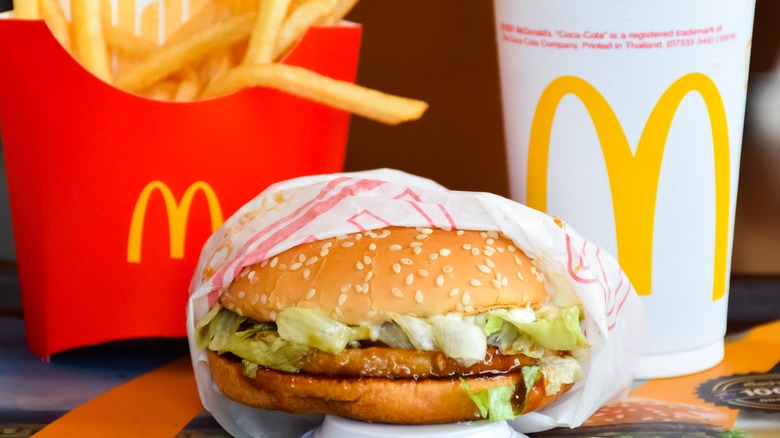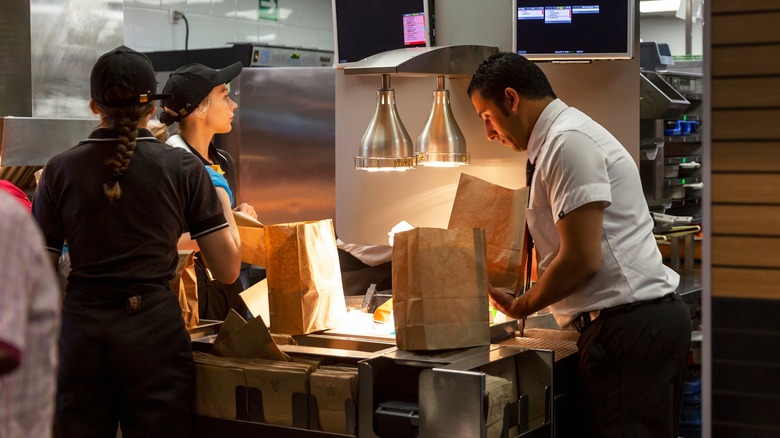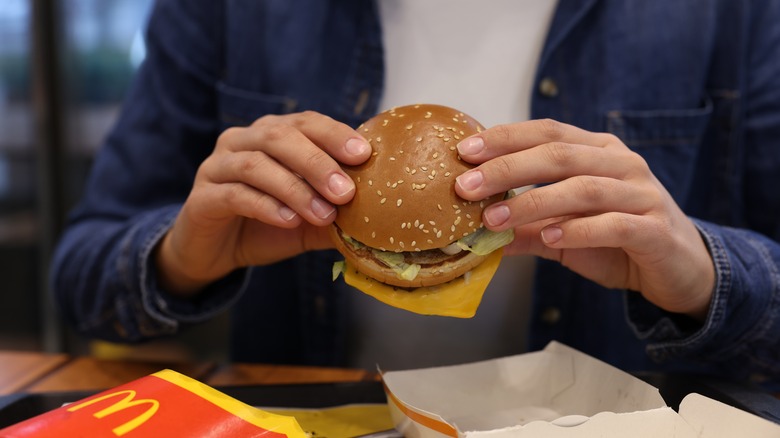The Myth About McDonald's Buns You Shouldn't Believe
As one of the top restaurant chains in the world, McDonald's certainly commands the attention of fast-food fans. Along with this attention comes quite a bit of rumor milling, which in many cases involves the alarming longevity of food from the restaurant. The claim that McDonald's burgers never rot is pretty legendary, and now some consumers are claiming that the chain's buns are equally immune to the ravages of time.
Mike Haracz, who was once employed as a corporate chef at the fast food chain, is here to dispel these rumors via TikTok. As Haracz explains, McDonald's buns will eventually go bad like all other bread products, but that dehydrated food can sometimes appear falsely preserved and lack obvious mold growth. Mold requires food, moisture, and warmth to thrive, and environments lacking moisture and humidity may delay its growth. That explains why some people have had the experience of a McDonald's hamburger lasting years without ever falling victim to mold growth.
No bread is safe from mold
The high temperatures necessary to bake fluffy bread do deter mold growth, but floating mold spores can attach themselves to breadstuffs the minute they depart from the heat of the oven. If the conditions are right, meaning the spores have access to sustenance, warmth, and moisture, mold will grow. Remember that while it's okay to eat some foods if they're moldy, bread does not fall into that category.
@chefmikeharacz Replying to @pitnwlf1530 Former #McDonalds corporate chef talks about their food going bad. #McDonaldsTikTok #mcdonaldssecrets #mcdonaldsccsing #mcdonaldschallenge #mcdonaldshacks #mcdonaldsdrivethru #fastfood #fastfoodstories #fastfoodlife #FYP #food #foodfestontiktok #tiktokfood #foodtiktok #foodtok #mcdonaldsworker
Some commenters on Haracz's TikTok clip offer additional reasons why mold is less likely to develop on McDonald's buns. A person claiming to be a McDonald's employee with two decades of experience under their belt states, "our buns are timed ... We have [36 to 48 hours], if they are not used in that time they are thrown out." Another commenter says, "[People] don't realize how much safety goes into their food." And while accidentally eating a small amount of mold isn't likely to harm your health, it's certainly an off-putting experience that McDonald's strives to avoid.
McDonald's takes steps to naturally preserve its menu items
Lots of popular foods are subject to rumors about chemicals that give them an unnaturally long shelf life. For instance, some claim that Twinkies never actually expire, even though plenty of people have offered evidence of these sweet treats developing mold. The truth behind these rumors is that companies, including McDonald's, take steps to reduce spoilage, and these steps do not typically involve hazardous chemicals. Mike Haracz explains in his TikTok video regarding moldy buns that McDonald's cooks its burgers until they're well-done, which means they possess less moisture and, as a result, are less susceptible to molding.
As for Haracz's claim that the fast-food chain uses mold inhibitors, that's not entirely clear. For those unaware, mold inhibitors like sodium propionate and sorbic acid are found in lots of baked goods because they can extend the shelf-life of products. While McDonald's states that it doesn't use preservatives in its hamburgers, the restaurant doesn't explicitly name mold inhibitors as one of the preservatives it avoids, nor does it mention what's in its buns. In the event the chain's bread products do contain preservatives, there's little chance that they will negatively impact a person's health (much like how the small amount of acrylamide found in McDonald's fries is not usually cause for concern).


